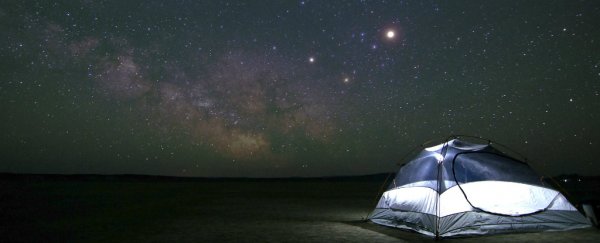With all the distractions of modern life (hello, Netflix), many of us are struggling to fall asleep at night and then find it hard to drag ourselves out of bed in the morning.
But the results of small new study suggest that a weekend of camping could be enough to help reset the circadian rhythms that are keeping us awake.
Researchers from the University of Colorado, Boulder monitored the sleep patterns of people living their regular lives at home, and those who spent a weekend camping without artificial light, and not only saw that they went to bed earlier, but follow-up results also showed that their melatonin expression had shifted.
Melatonin is the hormone that's released in response to darkness at night to make us feel sleepy, but the problem is that many of us are staring at our screens for longer than ever before, which means melatonin is getting released later than it should be, and our body clocks are getting out of whack.
But the team showed that camping away from artificial light, even just for a weekend, could help fix the problem.
The study compared nine people who went camping during the Northern Hemisphere summer with five people who stayed at home, and showed that the campers fell asleep up to 1.8 hours earlier than those who stayed home, and woke up earlier too.
An even bigger difference was seen when the researchers sent five people camping for a week during the winter solstice - the extra time in the outdoors resulted in melatonin being released in their bodies 2.6 hours earlier than before the experiment.
To be clear, this is an extremely small sample size, so we can't read too much into the results until they're verified and replicated in a much larger group. But the study suggests that even as little as a weekend away from artificial lights could help reset our circadian rhythm.
"Late circadian and sleep timing in modern society are associated with negative performance and health outcomes such as morning sleepiness and accidents, reduced work productivity and school performance, substance abuse, mood disorders, diabetes, and obesity," said lead researcher Kenneth Wright.
"Our findings demonstrate that living in our modern environments contributes to late circadian timing regardless of season and that a weekend camping trip can reset our clock rapidly."
The researchers performed two experiments in their latest study. First they sent five people camping around the time of the winter solstice when the days were their shortest, and gave them no access to flashlights or cell phones (campfires were allowed).
They monitored their sleep and hormonal rhythms throughout the day, and showed that their body clocks - which were measured by the time that melatonin levels began to rise in their bodies - moved more than 2.5 hours earlier during their week camping than they usually were at home.
That's all well and good, but even for the most avid campers, a week camping with no artificial light is pretty extreme. So the team conducted a follow-up study where nine people were sent camping during summer for a weekend, with access to flashlights and headlamps, but still no phones.
They compared the times that participants fell asleep (tracked using a wrist monitor that measured heart rate) with five people who just stayed home and continued their regular lives for a weekend. After the weekend, both groups had their melatonin levels measured using saliva tests.
The weekend campers fell asleep up to 1.8 hours earlier than those who stayed home, and after the weekend their melatonin levels were spiking about 1.4 hours earlier.
The team didn't monitor how long the effects lasted, so future research is needed to establish whether this is anything more than a short-term solution.
But the results mirror a similar study the team conducted on eight adults back in 2013, which showed that a week of camping without electricity during the summer months could shift people's body clocks back around 2 hours, so people were naturally falling asleep around 10pm and waking up at 6am.
For those who hate the outdoors, that's okay too. The study also suggests that simply increasing daylight exposure in our normal lives could also do wonders.
"Our findings highlight an opportunity for architectural design to bring in more natural sunlight into the modern built environment and to work with lighting companies to incorporate tunable lighting that would be able to change across the day and night to enhance performance, health, and wellbeing," explained Wright.
The research has been published in Current Biology.
